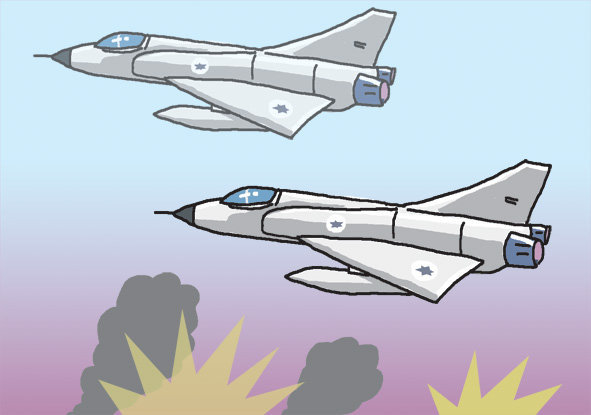Lessons of Six-Day War
Lessons of Six-Day War
Posted September. 14, 2021 07:56,
Updated September. 14, 2021 07:56

One of the elements that helped Israel win the Six-Day War in 1967 was its command of the air. In numbers, the military power of the Israeli Air Force was only one third of neighboring Arab countries. On the first day of war, however, the Israeli Air Force launched a series of airstrikes, annihilating the Egyptian, Jordanian, and Syrian air forces and defeating the Iraqi air force as well.
Egypt had 358 fighter jets and bombers, but 274 of them were lost in attacks on the first day. Even undestroyed fighter jets were not in serviceable condition. With airfields and runways destroyed, Arab countries not only lost their air superiority but had to see their fighter jets disappear from the sky. Considering the unusual terrain of the Sinai Desert, the loss of air superiority had a huge impact on ground warfare. While retreating, the Egyptian forces suffered terrible damage from ruthless chasers from the sky.
Israel’s perfect victory in the Six-Day War was something that even the military leaders had not anticipated. Now that we know the result of the war, it feels like an easy victory for Israel. But Israel at that time was terrified before the attacks as it deployed all of its air forces without leaving defense units to protect its airspace. If Israel had failed in one or two attacks, it would have been helplessly exposed to counterattacks.
It was a bold decision rarely seen in the history of war, but that was not all. An unchanging rule in the history of war is the fact that there is always a help from the enemy in every one-sided, great victory. The Egyptian air forces left their military aircrafts outside hangars. Why they did so is still a mystery. There was no reserve runway to make a sortie when it was attacked by the enemy. When it was under attack, it issued a ban on firing out of fear of friendly fire. The biggest mistake Egypt made was ignoring its air force’s prediction that Israel would launch a preemptive attack and issuing guidelines to launch a counterattack after its troops are attacked first. It was for the world’s opinion of Egypt and then-president Nasser’s reputation. The military must not intervene in politics and politicians must not intervene in the military’s affairs. That is the first lesson of the Six-Day War.




![17년 망명 끝에, 부모 원수 내쫓고 집권[지금, 이 사람]](https://dimg.donga.com/c/138/175/90/1/wps/NEWS/IMAGE/2026/02/18/133376197.3.jpg)


